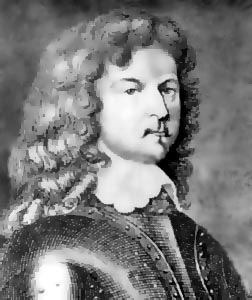 |
 |
|||
|
|
 Sir
John Boys (1607-1664) Sir
John Boys (1607-1664)Born: 1607 at Bonnington, Kent Governor of Donnington Castle Died: 8th October 1664 at Bonnington, Kent Sir John Boys was the eldest son and heir of Edward Boys of Bonnington (Kent), by Jane, daughter of Edward Sanders of Northborne. He was baptised at Chillendon in Kent, on 5th April 1607. During the English Civil War, he became a captain in the Royal army and Governor of Donnington Castle in Berkshire. This castle, within a mile of Newbury, was garrisoned in 1643 for King Charles I and commanded the road from Oxford to Newbury and the great road from London to Bath and the west. Boys, by the bravery with which he defended the castle during a long siege, showed himself well worthy of the trust reposed in him. It was first attacked by the Parliamentary army, consisting of 3,000 horse and foot, under the command of Major-General Middleton, who attempted to take the castle by assault, but was repulsed with considerable losses: at least 300 officers and men. Not long afterwards, on 29th September 1644, Colonel Horton began a blockade, having raised a battery at the foot of the hill, near Newbury. From here, he plied the castle so incessantly during a period of twelve days that he reduced it to a heap of ruins, having beaten down three of the towers and a part of the wall. Nearly 1,000 great shot are said to have been expended during this time. Horton, having received reinforcements, sent a summons to the Governor, but Boys refused to listen to any terms. Soon afterwards the Earl of Manchester came to the siege with his army, but their united attempts proved unavailing; and after two or three days more of ineffectual battering the whole army rose up from before the walls and marched in different directions. When the King came to Newbury on 21st October 1644, he knighted the Governor for his good services, made him Colonel of the regiment which he had before commanded as Lieutenant-Colonel to Earl Rivers, the nominal Governor of Donnington and, to his coat of arms, gave the augmentation of a golden imperial crown or on a blue canton. During the Second Battle of Newbury, Boys secured the King's artillery under the castle walls. After the battle, when the King had gone, with his army to Oxford, the Earl of Essex, with his whole force, besieged Donnington Castle with no better success than his predecessors had done. He abandoned the attempt before the King returned from Oxford for the purpose of relieving Donnington on 4th November 1644. The food stores were then replenished and his Majesty slept in the castle that night with his army around him. In August 1648, Boys made a fruitless attempt to raise the Siege of Deal Castle. A resolution put in the House of Commons, at the same time, to banish him as one of the seven Royalists who had been in arms against Parliament since 1st January 1648 was rejected. In 1659, he was a prisoner in Dover Castle for petitioning for a free Parliament, but was released on 23rd February 1660. He apparently received the office of Receiver of Customs at Dover from Charles II. Sir John Boys died at his house at Bonnington on 8th October 1664 and was buried in the parish church of Goodnestone-next-Wingham in Kent. The inscription describes his achievements in the wars. By his first wife, Lucy, he had five daughters. He had no children by his second marriage to Lady Elizabeth Finch, widow of Sir Nathaniel Finch, Sergeant-at-Law, and daughter of Sir John Fotherby of Barham (Kent). Edited from Leslie Stephen's
'Dictionary of National Biography' (1885)
|
|||
| © Nash Ford Publishing 2001. All Rights Reserved. | ||||


